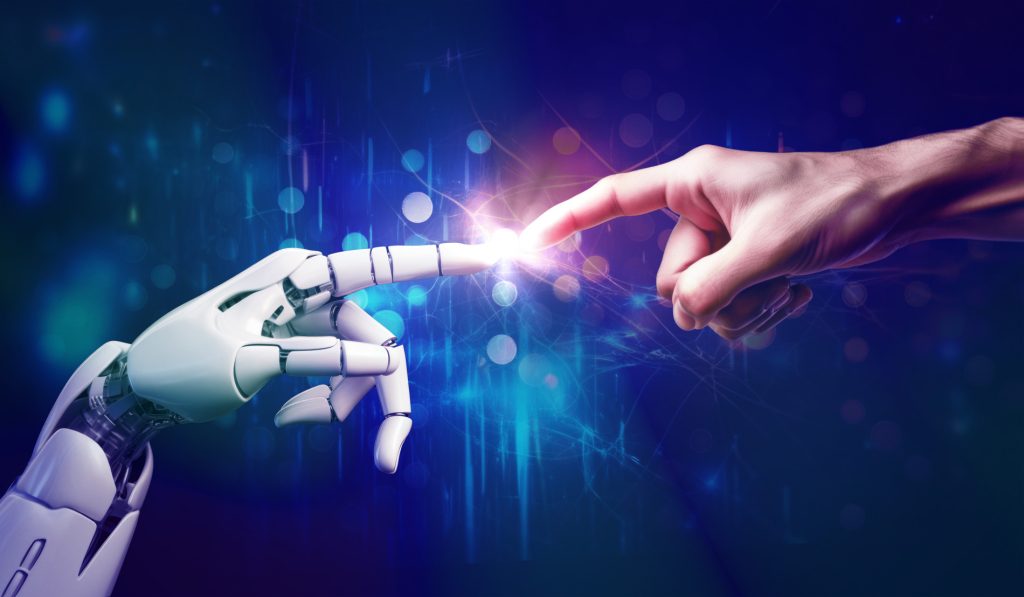4 Interesting Ways AI Might Just Boost Your Career
RECRUITMENT • Aug 7, 2023

While we’ve been hearing for years that the robots are coming for our jobs, lately, such sentiment seems closer to reality than ever. A recent report from Goldman Sachs claimed that AI could replace the equivalent of 300 million full-time jobs, whilst another survey revealed that 77% of us are anxious about the impact it could have on our future career prospects. And with the UK government keen to promote investment in AI to drive productivity across the economy, it seems the revolution has only just begun.
However, while AI replacing human workers makes for good headlines, most experts agree that tech advances such as large language models are far more likely to help us work smarter, rather than making us all redundant – at least for the time being. For example, Future of Work Director at Oxford University Carl Benedikt Frey recently noted that there’s “no way of knowing how many jobs will be replaced by generative AI”, while Technology Secretary Michelle Donelan indicated that the UK government is keen to take steps to ensure that “AI is complementing the way we work, not disrupting it.”
A quick glance at history offers a reassuring perspective, too. Throughout history, emerging technologies have always sparked fears of mass unemployment. Albert Einstein blamed ‘machines’ for the joblessness of the 1930s, while the economist John Maynard Keynes coined the term ‘technological unemployment’ to describe the impact of machines replacing human labour. Yet, individuals and societies repeatedly demonstrate an ability to adapt and thrive in the face of change, with the World Economic Forum issuing the optimistic prediction that within the next couple of years, technology will create at least 12 million more jobs than it destroys. With all this in mind, let’s take a look at some of the positive ways generative AI is impacting with working life.
1. The creation of new jobs
These days you’re more likely to encounter a typewriter in your nan’s loft than in an office, but for most of the 20th century, typists were in incredibly high demand. With the invention of the PC, the profession eventually became extinct. However, thanks to the development of computers, entirely new and previously inconceivable jobs emerged, such as graphic design and software development. In much the same way, the development of new AI tools like Bard and ChatGPT have created roles none of us had heard of five years ago. For example, the demand for ‘prompt engineers’ has skyrocketed – experts who specialise in inputting the correct instructions to achieve the desired result when using generative AI tools. Similarly, ‘machine managers’ oversee AI-operated hardware and systems, while ‘AI auditors’ ensure output is accurate and unbiased.
2. Increased efficiency
Hate data entry, or dealing with customer complaints? Good news – our robot friends can’t get enough of it! One key area of AI infusion is in the automation of repetitive and mundane tasks, leaving our human minds free to focus on creative solutions, complex problem-solving, and impactful work. One example of this we’re already well acquainted with is AI chatbots for handling common queries and redirecting customers to the correct person or resources. From information gathering to initiating the process of filing complaints, the manual time needed to complete certain tasks has been dramatically reduced. Generative AI tools are also proving to be incredibly impactful within fields such as software development, automating tedious and repetitive tasks such as code reviews, testing and debugging, with research suggesting it helps make programmers up to ten times more productive!
3. Improved communication and creativity
Many adults struggle with written communication, for a variety of reasons – dyslexia, language barriers, poor literacy skills or even a simple lack of confidence. Whether you need help double-checking spelling and grammar on your CV or composing an email to your boss asking for a pay rise, tools such as ChatGPT are fast becoming indispensable. Generative AI can also be a great creativity booster. For example, let’s say you’re struggling with inspiration for your company’s social media pages – there’s a plethora of tools out there to help kick-off a brainstorming session. Naturally, the ability of large language models to replicate human communication is also a source of anxiety, particularly within creative sectors such as PR and journalism. However, to speculate that generative AI will replace creative professions entirely is to vastly underestimate the skillsets required for such roles. For example, while ChatGPT can write a passable blog post, it can’t perform all the tasks a human content writer can, such as implementing an effective organic SEO strategy, undertaking in-depth research, or creating content based on an intuitive understanding of human psychology and social dynamics.
4. Enhanced learning and development opportunities
Take a moment to think about the last time you started a new job, and the amount of information you needed to absorb to become acquainted with your new workplace and feel confident in your position. Wouldn’t it be great to have a helping hand? Research from Stanford and MIT found that generative AI tools can be especially effective at helping newer and less experienced employees gain support and institutional knowledge, enabling them to become proficient in their roles more quickly. Instead of networking at random and hoping to make the right connections, experts have also speculated that generative AI could be used to help identify mentors and role models for junior employees, and to map professional development accordingly. It can also analyse data such as skills and performance reviews to identify areas in which employees may need further training, and even tailor it to an individual’s existing competency level.
In conclusion, while it’s undoubtedly true that AI is set to transform the world of work as we know it, it’s not all bad news. Just as the development of computers revolutionised industries and created new opportunities, the rise of AI presents a similar landscape of potential. In the grand tapestry of progress, AI is but a single thread, woven alongside human ingenuity and aspirations.
Don’t believe us? Just ask ChatGPT: “AI replacing all human workers? Not unless they figure out how to procrastinate and complain about Mondays!”
Ready for a career boost? We’ve hundreds of positions available in industries such as accountancy, human resources, marketing and digital, IT, and many more. Alternatively, you can search all our positions here, or register with us.





